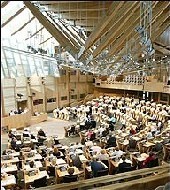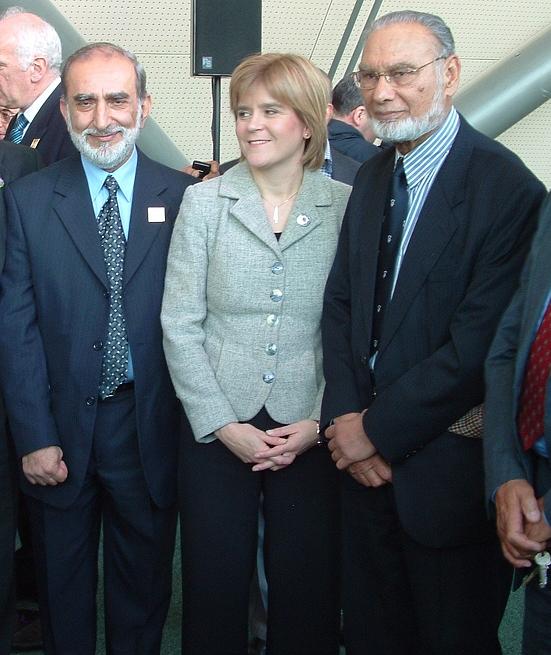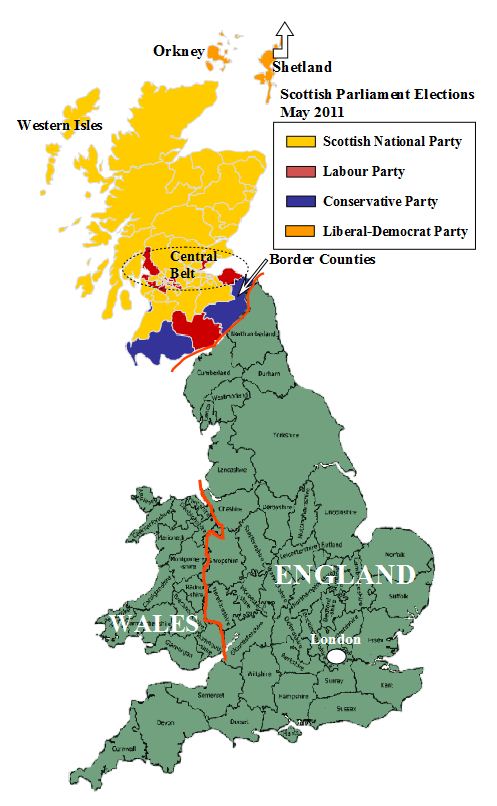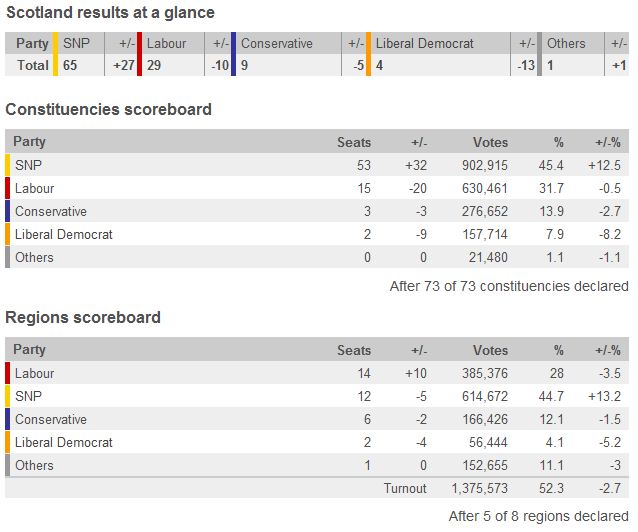 Websites
Websites
|
|
|
|
|
Scottish electorate rush to nationalist party
In the current elections for the Scottish Parliament mass defections from particularly the Liberal Democrats but also from the Labour party sees Scotland as a nation now clearly under the governance of the Scottish Nationalist Party.
 THE OUTCOME of the 5 May 2011 Scottish Parliamentary elections gives the Scottish National Party a very strong mandate for government and raises the prospect of a stronger push for Scottish independence. THE OUTCOME of the 5 May 2011 Scottish Parliamentary elections gives the Scottish National Party a very strong mandate for government and raises the prospect of a stronger push for Scottish independence.
A brief historical overview
Scotland has - as other nations - a history of mixed voting. The northern isles of Orkney and Shetland have tradtionally stayed away from the two main parties of Labour and Conservative. Part of the underlying reason being that these communities see themselves being as much Nordic as British. Conversally the counties on the Scotland-England border have traditionally voted for the Conservative party which is strongly unionist in terms of keeping the UK nations together under a London-based parliament.
The central belt which contains the bulk of the Scottish population has seen been traditionally Labour in the West (Glasgow/Strathclyde) whilst tending more towards Conservative in the east (Edinburgh/Lothians).
Changed scene: the 'Separation' question
However the map of Scotland is now substantially bedecked in the colour yellow. The principal loser has been the Liberal-Democratic Party (Lib-Dems) - many of whose previous voters have been very unhappy with the Conservative/Lib-Dem alliance which is now running the Westminster (UK) Parliament.
The pressure will now be on the SNP to hold a referendum on Scottish independence. While the SNP will still be wary about the outcome, the chances of achieving a 'Yes' vote have probably increased dramatically and, even if not, to desist from a referendum would leave the SNP looking as toothless tiger and detract from the credibility which the current results bestow on the nationalist party.
Any move towards a totally-indepedent Scotland would have massive political, ecomomic and constitutional implications. And the fact that new Scottish Parliament which was(re-)installed in 1999 commences the daily proceedings with a multi-faith 'Time for Reflection' does not suggest that the nation – or at least a Scottish Parliament left to its own devices – sets much store by Scotland's predominantly Christian heritage. However ....
Parliamentary Prayer Scotland
A team of intercessors under the leadership of Anne McIntyre maintains a Christian presence within the political process and has done so from the earliest days of the Parliament. The Parliamentary Prayer Scotland team meets to pray every week in Edinburgh and sends out a regular 'Current Issues' update on request to those who wish to stay in touch with developments in the political scene.
Other faiths
 Alex Salmond, the SNP leader wrote the foreword to a book entitled 'The Thistle and the Crescent' – a (rather-contrived) account of the historic relationships between Scotland and Islam. Alex Salmond, the SNP leader wrote the foreword to a book entitled 'The Thistle and the Crescent' – a (rather-contrived) account of the historic relationships between Scotland and Islam.
The author of the book is Bashir Mann, a Muslim grandee and former Glasgow councillor who has now swung his weight behind the SNP -
Former Labour councillor and leading Glasgow figure endorses the SNP Former Labour Councillor and leading figure in Glasgow Bashir Maan has endorsed Nicola Sturgeon, Alex Salmond and the SNP in Scotland's election.
In a statement Bashir Maan said: "I am delighted to support Nicola Sturgeon for re-election."
Bashir Maan (right) with Deputy First Minister of Scotland Nicola Sturgeon (now Deputy First Minister) and Professor Salim Al-Hassani during the launch of the exhibition 1001 Inventions in Glasgow Science Centre (24 October 2007).
Christian Parties
In the 2011 elections the Christian Peoples Alliance Party and the Scottish Christian Party both fielded candidates. Dr. Donald Boyd stood for the Scottish Christian Party in 2007, the General Election of 2010 and in 2011 as the leader of the SCP. The Party fielded candidates in all of the eight regions. Neither party gained a seat.
Proportional Representation Referendum
In addition to voting for the Scottish Parliament, voters have also been asked to register their opinion on moves towards a UK-wide system of proportional representation. The referendum will ask people to vote "Yes" or "No" to the following question: "At present, the UK uses the first-past-the-post system to elect MPs to the House of Commons. Should the alternative vote system be used instead?"
Breaking news: The UK has voted overwhelmingly to reject changing the way MPs are elected - dealing a bitter blow to Nick Clegg on top of heavy Lib Dem poll losses. Read on.....
Outcome of 2011 Scottish Parliament elections

Note: In the table below the 'Constituencies scoreboard' relates to individual candidates/seats for defined geographic consitituencies: the 'Regions scoreboard' relates to seats one under the proportional representation element of the voting system and are awarded to parties on a regional basis. The parties then appoint those whom they wish to take these seats in the Parlaiment.
 |
Christians Together, 06/05/2011
|
|
|
|